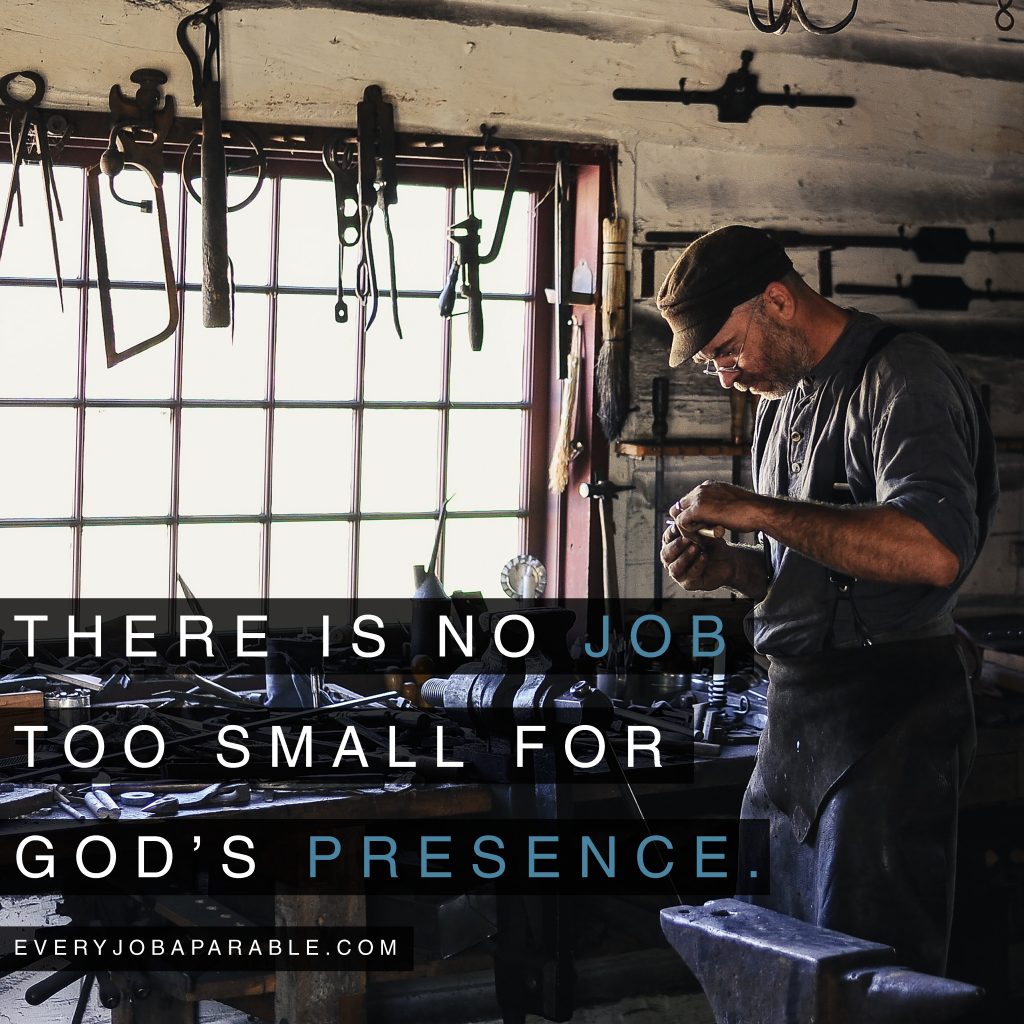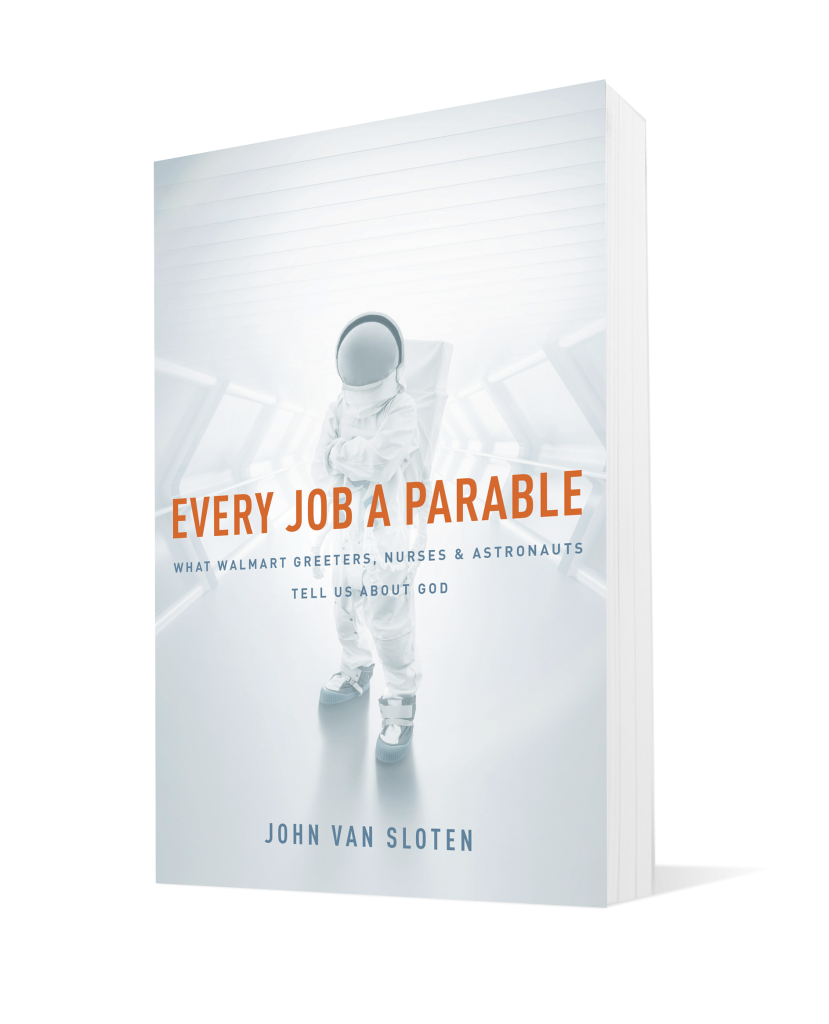I am convinced that there are as many different ways of knowing God at work as there are workers, and that each person’s experience of God on the job is as unique as his or her fingerprint.
Each of us has a vocational love language with which we best relate to God at work.
God gave us this language because he loves us and wants to know us personally. Because his love is universal and unlimited, God connects with each person wherever they are, via a language that is best for them.
God speaks your language. . . your vocational love language.
The God of all creation speaks physics, chemistry, and biology; prose, poetry, and computer programming; leadership, organizational behavior, and accounting; planning, serving, and cleaning; and creativity, shape, and color.
God speaks all of these languages and more. Often he speaks them through you in a way that resonates and feels natural. This way is your vocational love language: a way of operating that connects with God’s way of operating, a unique way in which you image a working God.

Your capacity for reason, hand-eye coordination, high emotional intelligence, hospitable heart, passion for justice, desire to serve, or talent at repairing broken things comes from him! These aptitudes come from him, reflect him and point back to him! God is a God who is reason, coordination, emotion, hospitality, justice, service and the repairer of all broken things.
So when you express the unique vocational capacities that you’ve been given, you’re using a language that God already knows; your vocational love language is in a very real sense connected to his!
Maybe you’re good with working with your hands; you have an ability to transform abstract ideas into concrete creations. Whether in the studio, on the factory floor, or at the construction site, whenever you do this kind of work, you should know that you are imaging the God who built the material cosmos . . . all from one big idea!
Maybe you’re good with data; you have an empirical way of engaging with and reading reality. Whether you are in the lab or in the accounting department when you do this kind of work, you affirm that you were made by the God of all data, the one who created the data in the first place. Your way of working images an empirical God. He made your mind so that it was amenable to knowing him through the data-generating universe that he made!

Perhaps creativity is your thing; you have an ability to see connections that no one else sees, to express truth in a compelling way, or to come up with the solution that’s been eluding everyone else. If you’re this kind of person, you won’t have too much trouble imagining that you are made in the image of an imaginative God! The God who conceived of the cosmos in all of its complexity speaks imagination. Your ability to catch creative ideas that fly through your mind—that appear out of nowhere—is like God’s!
Or maybe what drives you is a passion to save people and things: kids who don’t have a chance, patients in an emergency room, or cars that aren’t running properly. You see broken things, and you’re undone—all you can think about is fixing them. You realize that you’ve got the tools to help, and you want to help. Of course you come by this saving heart honestly. God saves, and Jesus is making all things new (Revelation 21:5); and his definition of “all things” includes the people, places, and things that you save through your work.
The list of vocational love languages goes on and on. What’s yours?
As I’ve conducted research for the many vocational sermons I’ve preached (and written my book Every Job a Parable: What Walmart Greeters, Nurses, and Astronauts Tell Us about God), I’ve discovered that discerning your vocational love language comes down to three simple questions:
- What do you love most about what you do? Recall one of those “just right” moments of flow when you’ve gotten lost in your work, when time seemed to disappear, and when you were caught up in the truth and goodness of what you were doing. Write down what happened and unpack it. Try to name the nature of what you love as fully as you can.
- How is what you love like what God loves? In order to know what God loves, you need to be well versed in what the Bible teaches. When you know the God of the Bible, you’ll have more perspective with which to recognize him at work. As you get to know God’s creating, managing, and saving ways in the Scriptures, you’ll be able to recognize him at work in those ways in you and in others.
- What do others say you’re good at? Ask a friend to name what you do best. Don’t worry about your ego. If what you’re good at is really a gift from God, then your friend’s response will only draw attention to God. Sometimes our discerning is best done in community. Reverse the process and try naming where God is at work in others. As you learn to recognize God’s vocational love language in them, you’ll increase your capacity to discern his love language in you. This back-and-forth naming process will help you get a clearer sense of your vocational love language.
As you engage these questions, keep an open mind. If God speaks an infinite number of languages, then your love language might be very distinctive. Consider all of the different workers God speaks through in the Bible: kings, managers, poets, shepherds, metalworkers, stonemasons, homebuilders, judges, laborers, farmers, jewel merchants, fishermen, potters, warriors, landlords, and vineyard owners (to name a few). Take note that every prophet, priest, and leader through whom God spoke in the Scriptures was a different person and therefore had a unique vocational love language!

Once you think you’ve identified your primary vocational love language, lean into it and ask God to help you master it. Pray that the Holy Spirit opens your eyes to God’s on-the-job presence and your ears to his voice. Ask God to take those moments of flow and fill them with an increased awareness of how your vocational way images his, filling your work with an increased sense of the sacred. Meet God through the work you do. Experience his vocational presence.
You are made to know God in all that you do; including the 40 percent of your life you spend working. God is more present there than you know. And I think he wants you to know that.
John Van Sloten is a pastor in Calgary, Alberta. He is the author of The Day Metallica Came to Church. He’s preached sermons on dozens of different jobs and has been the recipient of several John Templeton Foundation grants for preaching science. Click to learn more or start reading chapter one from his new book, Every Job a Parable: What Walmart Greeters, Nurses, and Astronauts Tell Us about God.


Love this article. Thank you!
I was expecting more of a quiz than a description of this. I know I lean on the creative side but also the caring side as well. As a wife mother grandma and aunt great aunt I can only do so much. But I like to create things in a few areas. And help others when able to do so.